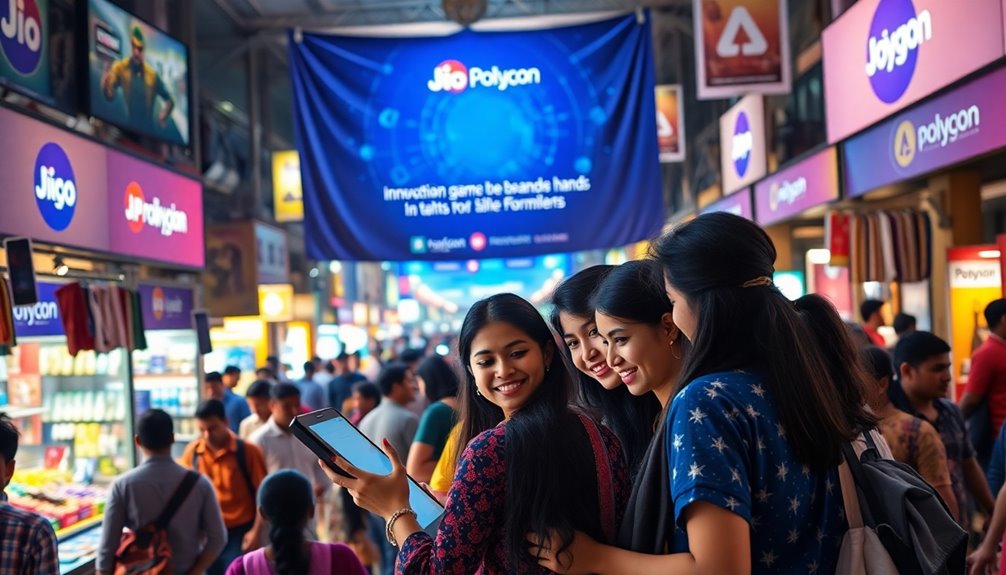Polygon's team-up with Reliance Jio aims to bring groundbreaking blockchain technology to you and 450 million other users. This collaboration enhances privacy and data control, allowing for secure transactions through various Jio applications. With Polygon's capacity to handle thousands of transactions per second, you'll experience a seamless digital environment as Jio transitions to Web3. They're also focusing on adhering to regulatory standards, ensuring a safe user experience. This partnership not only addresses issues like spam and fraud but sets the stage for innovative, personalized services. Keep an eye out for more updates on this exciting development.
Key Takeaways
- Reliance Jio is collaborating with Polygon to enhance user privacy and data control for 450 million customers through blockchain technology.
- The partnership aims to provide secure transactions and introduce new services leveraging Polygon's capability to process thousands of transactions per second.
- Jio is committed to adhering to regulatory standards while developing robust data protection measures to balance transparency and privacy for users.
- The collaboration will streamline content partner settlements, improving operational efficiency and enhancing overall user experiences.
- This initiative is part of Jio's transition towards Web3, aiming for personalized and rewarding digital experiences for its user base.
Blockchain for Jio's User Base

As Reliance Jio integrates blockchain technology, you'll find your digital experiences becoming more secure and efficient.
Through a partnership with Polygon, Jio aims to enhance privacy and give you greater control over your personal data. This collaboration is set to benefit 450 million Jio customers, ensuring that a vast audience can take advantage of these advancements.
With this integration, expect various Jio applications to utilize blockchain, enabling you to enjoy secure transactions and access to new services.
The Polygon network can process thousands of transactions per second, ensuring speedy interactions.
This shift towards Web3 opens up a world of personalized, rewarding, and faster digital experiences.
You'll also benefit from a growing ecosystem of decentralized applications, paving the way for innovative use cases like digital identity tools, secure payments, and more.
Embrace the future with Jio's blockchain advancements!
Regulatory Approvals and Compliance Updates

While integrating blockchain technology, Reliance Jio is committed to adhering to regulatory standards and ensuring compliance with the Telecom Regulatory Authority of India's (TRAI) regulations. The company is partnering with Polygon Labs to create a regulatory sandbox, fostering innovation while staying aligned with these regulations. This collaborative effort aims to enhance user experiences for Jio's 450 million subscribers while addressing issues like spam and fraud in communications. As the deployment of this technology progresses, Jio and its partners focus on developing robust data protection measures to balance transparency and privacy. Experts suggest that blockchain technology can also streamline content partner settlements, further improving operational efficiency.
User Adoption Rates and Growth

Reliance Jio's integration of blockchain technology aims to enhance user experiences, but understanding how users are adopting this technology is equally important.
As of 2024, 6.8% of the global population owns cryptocurrency, with male users predominating. Notably, younger generations, particularly those under 34, represent a significant portion of adopters. Blockchain miners account for 0.2% of global energy consumption, raising awareness about the environmental impact of this technology. Additionally, the rise of new Bitcoin holders controlling 50% of supply indicates a strong demand for cryptocurrencies.
Between 2018 and 2020, the global user base surged by nearly 190%, showing a remarkable compound annual growth rate of 99%. In regions like Ukraine and Russia, adoption thrives, driven by trust issues with traditional finance.
While 86% of Americans have heard of blockchain, a knowledge gap exists, with 13% admitting they know little about it. As awareness grows, user adoption is set to expand further.
Corporate Partnerships and Collaborations

Corporate partnerships are driving innovation in blockchain technology, significantly enhancing user experiences and operational efficiencies.
Take Ripple and MoneyGram, for instance; their collaboration allows for quicker, cheaper international payments. Similarly, Polygon and Fidelity have integrated blockchain to facilitate cryptocurrency trading for institutional clients, showcasing the technology's versatility.
In the realm of Web3, Reliance Jio and Polygon Labs are teaming up to provide 450 million users with secure transactions and improved data control. This partnership follows the trend of companies like Ripple and MoneyGram, which have successfully showcased the potential of faster, cheaper international payments. The collaboration aligns with the growing demand for transparency in private equity, making blockchain an essential tool for modern financial transactions.
These corporate alliances not only foster decentralized applications but also ensure scalability, with Polygon's network capable of processing thousands of transactions per second.
Through these efforts, companies are reshaping industries and creating more robust, efficient systems that benefit everyone involved.
Government Partnerships and Initiatives

As governments around the world recognize the transformative potential of blockchain technology, they're actively exploring partnerships and initiatives to enhance public services and operational efficiency.
The global blockchain government market, valued at $2.5 billion in 2022, is projected to skyrocket to $218.6 billion by 2032. You'll see local governments experimenting with blockchain for various applications, like identity management and voting systems.
For instance, Santa Cruz County is testing a digital wallet pilot, while West Virginia has introduced mobile voting for overseas citizens. This shift towards enhanced data protection reflects a growing understanding of blockchain's capabilities in safeguarding sensitive information.
However, challenges like regulatory hurdles and the need for skill development persist. Engaging citizens in these initiatives is crucial for fostering trust and ensuring successful adoption of blockchain across the public sector.
Long-Term User Engagement Strategies

Blockchain's potential isn't just limited to government initiatives; it also opens doors for enhanced user engagement strategies in various sectors.
To keep users actively involved, consider implementing gamified experiences with token rewards, badges, and leaderboards that foster competition. Personalized onboarding ensures users feel catered to from the start, while data-driven insights can tailor recommendations to their interests. By leveraging decentralized governance, users can participate in decision-making processes, increasing their sense of ownership and connection to the platform. Engaging with online communities not only enhances user satisfaction but also fosters collaboration among users.
Building a community is crucial; encourage user-generated content and facilitate social interactions through forums and events. Transparency builds trust, so keep communication channels open and provide regular updates on platform developments.
Frequently Asked Questions
What Specific Blockchain Solutions Will Be Offered to Jio Users?
You'll experience enhanced privacy and data ownership with decentralized data control, allowing you to secure your personal information.
Enjoy high transaction speeds for seamless payments and uninterrupted video streaming, making your online activities smoother.
Secure identity verification tools will protect you against identity theft while ensuring convenient authentication.
Plus, integration with existing applications means you'll access tailored blockchain solutions, enhancing your overall digital experience.
Get ready for a more secure and personalized online journey!
How Will User Data Be Secured on the Blockchain?
User data on the blockchain will be secured through various advanced techniques.
You'll benefit from data encryption that uses cryptographic algorithms, ensuring your information remains private.
Digital signatures authenticate transactions, so you know they come from valid sources.
Hash functions create unique identifiers for your data, making alterations easy to spot.
Additionally, decentralized storage protects against unauthorized access, while consensus mechanisms enhance trust by preventing fraudulent activities within the system.
Are There Any Fees Associated With Using Blockchain Services?
Yes, there are fees associated with using blockchain services, but don't let that discourage you!
These fees are essential for maintaining the network. You'll encounter exchange fees for transactions, network fees for adding your transactions to the blockchain, and wallet fees for managing your assets.
Understanding these costs helps you navigate the blockchain more effectively, ensuring your transactions are processed promptly and securely, especially during busy periods.
What Types of Transactions Can Users Perform on the Blockchain?
You can perform various transactions on the blockchain, including buy, sell, trade, transfer, receive, and send transactions.
For instance, you can buy cryptocurrency with fiat or trade one crypto for another. If you receive crypto as a gift, that's a receive transaction, while sending crypto for purchases counts as a send transaction.
Each type impacts your holdings differently, and platforms like Coinpanda can help track these activities efficiently.
Will Users Need Special Devices to Access Blockchain Features?
Imagine stepping into a digital realm where your data dances freely, unchained and secure.
You won't need special devices to access blockchain features. Your existing smartphone or computer can adapt to these new capabilities seamlessly.
With no additional hardware required, you can enjoy enhanced privacy and security right at your fingertips.
This integration allows you to explore decentralized applications and enjoy innovative services without missing a beat in your digital life.
Conclusion
In teaming up with Reliance Jio, Polygon's introduction of blockchain technology to 450 million users could revolutionize digital transactions in India. Imagine a small farmer using blockchain for transparent supply chain tracking, ensuring fair prices for his produce. This partnership not only enhances user experience but also fosters trust in digital platforms. As user adoption grows, the potential for innovative applications will likely reshape industries, paving the way for a more connected and efficient economy.









